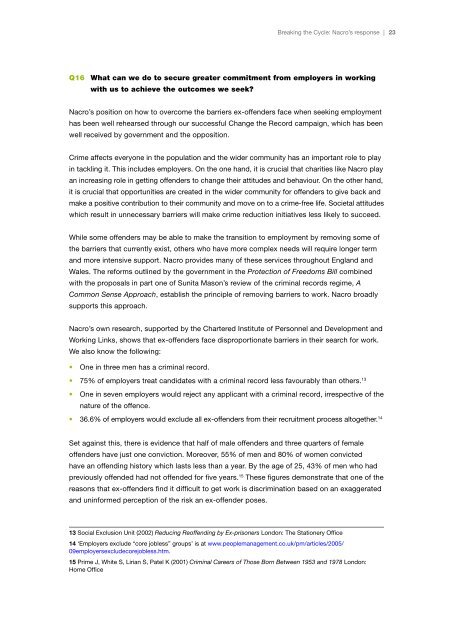Nacro's response to Breaking the Cycle Green Paper
Nacro's response to Breaking the Cycle Green Paper
Nacro's response to Breaking the Cycle Green Paper
You also want an ePaper? Increase the reach of your titles
YUMPU automatically turns print PDFs into web optimized ePapers that Google loves.
<strong>Breaking</strong> <strong>the</strong> <strong>Cycle</strong>: Nacro’s <strong>response</strong> | 23Q16 What can we do <strong>to</strong> secure greater commitment from employers in workingwith us <strong>to</strong> achieve <strong>the</strong> outcomes we seek?Nacro’s position on how <strong>to</strong> overcome <strong>the</strong> barriers ex-offenders face when seeking employmenthas been well rehearsed through our successful Change <strong>the</strong> Record campaign, which has beenwell received by government and <strong>the</strong> opposition.Crime affects everyone in <strong>the</strong> population and <strong>the</strong> wider community has an important role <strong>to</strong> playin tackling it. This includes employers. On <strong>the</strong> one hand, it is crucial that charities like Nacro playan increasing role in getting offenders <strong>to</strong> change <strong>the</strong>ir attitudes and behaviour. On <strong>the</strong> o<strong>the</strong>r hand,it is crucial that opportunities are created in <strong>the</strong> wider community for offenders <strong>to</strong> give back andmake a positive contribution <strong>to</strong> <strong>the</strong>ir community and move on <strong>to</strong> a crime-free life. Societal attitudeswhich result in unnecessary barriers will make crime reduction initiatives less likely <strong>to</strong> succeed.While some offenders may be able <strong>to</strong> make <strong>the</strong> transition <strong>to</strong> employment by removing some of<strong>the</strong> barriers that currently exist, o<strong>the</strong>rs who have more complex needs will require longer termand more intensive support. Nacro provides many of <strong>the</strong>se services throughout England andWales. The reforms outlined by <strong>the</strong> government in <strong>the</strong> Protection of Freedoms Bill combinedwith <strong>the</strong> proposals in part one of Sunita Mason’s review of <strong>the</strong> criminal records regime, ACommon Sense Approach, establish <strong>the</strong> principle of removing barriers <strong>to</strong> work. Nacro broadlysupports this approach.Nacro’s own research, supported by <strong>the</strong> Chartered Institute of Personnel and Development andWorking Links, shows that ex-offenders face disproportionate barriers in <strong>the</strong>ir search for work.We also know <strong>the</strong> following:• One in three men has a criminal record.• 75% of employers treat candidates with a criminal record less favourably than o<strong>the</strong>rs. 13• One in seven employers would reject any applicant with a criminal record, irrespective of <strong>the</strong>nature of <strong>the</strong> offence.• 36.6% of employers would exclude all ex-offenders from <strong>the</strong>ir recruitment process al<strong>to</strong>ge<strong>the</strong>r. 14Set against this, <strong>the</strong>re is evidence that half of male offenders and three quarters of femaleoffenders have just one conviction. Moreover, 55% of men and 80% of women convictedhave an offending his<strong>to</strong>ry which lasts less than a year. By <strong>the</strong> age of 25, 43% of men who hadpreviously offended had not offended for five years. 15 These figures demonstrate that one of <strong>the</strong>reasons that ex-offenders find it difficult <strong>to</strong> get work is discrimination based on an exaggeratedand uninformed perception of <strong>the</strong> risk an ex-offender poses.13 Social Exclusion Unit (2002) Reducing Reoffending by Ex-prisoners London: The Stationery Office14 ‘Employers exclude “core jobless” groups’ is at www.peoplemanagement.co.uk/pm/articles/2005/09employersexcludecorejobless.htm.15 Prime J, White S, Lirian S, Patel K (2001) Criminal Careers of Those Born Between 1953 and 1978 London:Home Office
















